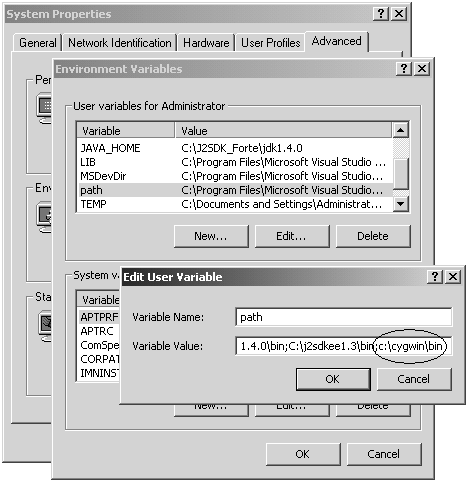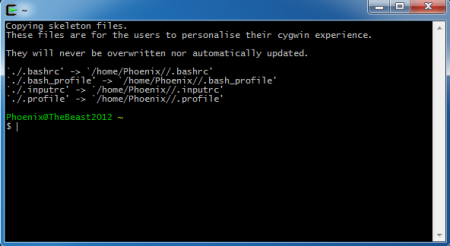
You can see that program in action here, where it: pax$ printf 'Hello,\tBob\nGoodbye, Bob\n' |. You can simply adjust the printf for whatever style of output you want.
Cygwin grep binary file matches code#
If ((ch = '\n') || ((ch >= ' ') & (ch <= '~'))), where NN is the hex code for the character. That's not really a good idea if you're running a terminal that interprets the output stream (such as VT/DEC or many others).Īlternatively, you can send your file through tr with the following command: tr '' '.' I don't even know if libpcre was ever ported to EBCDIC systems, I doubt many people will ever come across some of those these days.One way is to simply treat binary files as text anyway, with grep -text but this may well result in binary information being sent to your terminal. ¹ or NUL-delimited records with -null/ -z Perl loads the whole file in memory, pcregrep doesn't but has internal limits that would likely prevent you from processing files where 0xA bytes are far apart. To only print the byte offset of the first match. By default, under MS-DOS and MS-Windows, grep guesses whether a file is text or binary as described for the -binary-files option.

You can pipe the STDOUT to hexdump / od or similar. bashhistory output: Here I am reading first 1 KiB. bashhistory starts with non-text data, hence grep is treating the file as binary. perl -l -0777 -ne 'print "$-:$_" while /\x23.\xab/gs' < file Grep returns Binary file (standard input) matches when trying to find a string pattern in file. ( pcregrep doesn't have a -b option, -file-offsets which prints offset and length is probably the closest).

) or use perl with its slurp-mode: LC_ALL=C pcregrep -file-offsets -Ma '(?s)\x23.\xab' < file
Cygwin grep binary file matches how to#
To be able to search for bytes with arbitrary values including 0xA, you'd need to treat the whole input as a whole, not one line or nul-delimited record at a time like grep does.įor that, you could use pcregrep with its -M (multiline) option along with the (?s) flag (for newline not to be treated specially by. How to grep a text file which contains some binary data Syntax. So LC_ALL=C grep -P '\x23.\xab' would match on a sequence of 3 bytes, the first one with value 0x23, the second with any value except 0xA and the third one with value 0xAB. To match on a byte value within a range, as already said: (here for byte values 1 to 0x45 / 69)īut bear in mind that grep matches on the contents of text lines¹, so it will never find the newline character which is the line delimiter and, regardless of the locale always has value 0x0A² (10 in decimal). By default, grep prints the matching lines. (assuming the C locale or any local with single byte per character charset). grep searches the named input FILE s (or standard input if no files are named, or if a single hyphen-minus ( -) is given as file name) for lines containing a match to the given PATTERN. How is it possible that egrep sees piped data from functions as binary Does the zsh-vi-mode overload functionsNone of the functions declared in the plug-in seem have non-ascii characters. To match on any single byte, again, you can use. You can force grep to look at binary files with: grep -binary-filestext You might also want to add -o ( -only-matching ) so you don't get tons of binary gibberish that will bork your terminal. Thanks jeffreytse I can merge this right away, just want to understand what’s happening.

Matches on the 0xAB (171) byte, regardless of what character if any it represents in any charset. If you want to match on byte value, you should make sure the locale uses a single-byte charset, the C locale is probably your best bet. It is a synonym for the controlling terminal of a process, if any. So \xAB would match on the U+00AB character («) in a UTF-8 locale (where that character is encoded on 2 bytes: 0xc2 and 0xab) and the 0xAB byte in single-bytes locales (for instance, which represents the Ћ in a locale using the iso8859-5 charset). The file /dev/tty is a character file with major number 5 and minor number 0, usually of mode 0666 and oup root.tty. \xAB is PCRE syntax to match a character whose codepoint value expressed in hexadecimal is 0xAB (171 in decimal).Ĭodepoint here would be the Unicode codepoint in locales that use UTF-8 and byte value in locales that use a single byte charset (GNU grep -P doesn't support multibyte charsets other than UTF-8). There is no such thing as a hex character.

Grep -P '\xAB' doesn't look for a hex character.


 0 kommentar(er)
0 kommentar(er)
